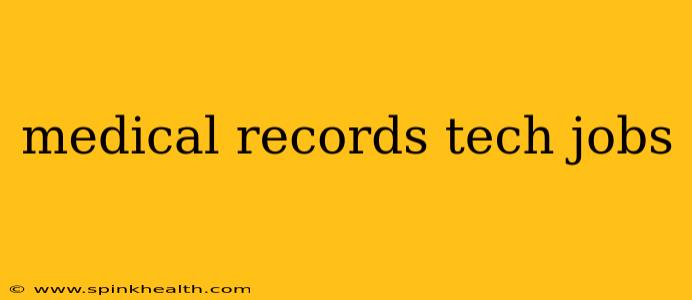Charting a Course: Exploring the Thriving World of Medical Records Tech Jobs
The world of healthcare is constantly evolving, and at the heart of this evolution lies the meticulous management of patient data. This is where medical records technology professionals step in, playing a crucial role in ensuring the accuracy, accessibility, and security of vital health information. If you're interested in a career that blends technology with healthcare, exploring medical records tech jobs could be the perfect path for you. This isn't just about filing papers; it's about leveraging technology to improve patient care and streamline healthcare operations.
What are the different types of medical records tech jobs?
The field offers a surprisingly diverse range of roles, catering to various skill sets and career aspirations. Let's explore some of the key positions:
-
Medical Records Technician: This is often the entry-level position, requiring an associate's degree or relevant certification. Technicians are responsible for the day-to-day maintenance of patient records, including data entry, filing, retrieval, and maintaining the integrity of the system. Think of them as the backbone of the medical records department, ensuring everything runs smoothly.
-
Health Information Manager (HIM): HIM professionals oversee the entire medical records process. They require a bachelor's degree and often hold certifications like Registered Health Information Administrator (RHIA) or Registered Health Information Technician (RHIT). They manage staff, develop and implement policies, ensure compliance with regulations (like HIPAA), and are responsible for the overall efficiency and accuracy of the medical records system. They're the strategists and leaders of the department.
-
Medical Coder: Medical coders translate medical diagnoses, procedures, and services into standardized alphanumeric codes. This is crucial for billing and reimbursement purposes. They require a strong understanding of medical terminology and coding systems like ICD-10 and CPT. Accuracy is paramount in this role, as incorrect coding can have significant financial consequences. They are the translators ensuring accurate financial processing.
-
Medical Biller: While closely related to medical coding, medical billers focus on the actual billing process. They prepare and submit claims to insurance companies, follow up on payments, and manage patient accounts. Excellent communication and organizational skills are essential. They’re the financial navigators, ensuring timely payments.
-
Electronic Health Record (EHR) Specialist: As healthcare increasingly relies on EHR systems, specialists who can implement, maintain, and train staff on these systems are in high demand. They may troubleshoot technical issues, provide user support, and optimize the system for efficiency. They’re the tech gurus of the medical records world.
-
Data Analyst (Healthcare Focus): Analyzing large datasets of patient information to identify trends, improve patient outcomes, and support research initiatives. This role requires advanced analytical skills and often a master's degree in a related field. They uncover valuable insights hidden within the data.
What education and certifications are needed for medical records tech jobs?
The educational requirements vary depending on the specific role. While some entry-level positions may only require a high school diploma or equivalent plus on-the-job training, many roles benefit from a formal education and certifications. Associate's and bachelor's degrees in health information management or related fields are common, as are certifications like RHIA and RHIT.
What skills are important for a career in medical records technology?
Beyond the formal education, certain soft skills and technical proficiencies are highly valued:
- Attention to detail: Accuracy is paramount in medical records management. Errors can have serious consequences.
- Organizational skills: Managing large volumes of data requires meticulous organization.
- Computer skills: Proficiency in various software applications is crucial, especially EHR systems.
- Medical terminology: A strong understanding of medical terminology is essential for all roles.
- Communication skills: Working with medical professionals and patients requires clear and effective communication.
- Problem-solving skills: Identifying and resolving issues efficiently is vital.
- Data analysis skills (for some roles): The ability to interpret and analyze data is increasingly important.
What is the job outlook for medical records tech jobs?
The job outlook for medical records technology professionals is strong. The increasing reliance on electronic health records, coupled with the growing demand for healthcare services, ensures a steady need for skilled individuals in this field. Moreover, the increasing emphasis on data privacy and security further underscores the importance of qualified professionals in this sector.
How can I find medical records tech jobs?
Numerous resources can help you find job openings in this field. Online job boards (Indeed, Monster, LinkedIn), professional networking, and directly contacting hospitals and healthcare systems are all effective strategies. Look for keywords like "medical records technician," "health information manager," "EHR specialist," and "medical coder" in your job searches.
Embarking on a career in medical records technology means becoming a vital part of the healthcare ecosystem. It's a field where you can make a tangible difference in people's lives, contributing to the efficient and accurate delivery of healthcare services. The path may require dedication and hard work, but the rewards—both personally and professionally—are significant.

